News
Academics rise to challenge with sustainable solutions
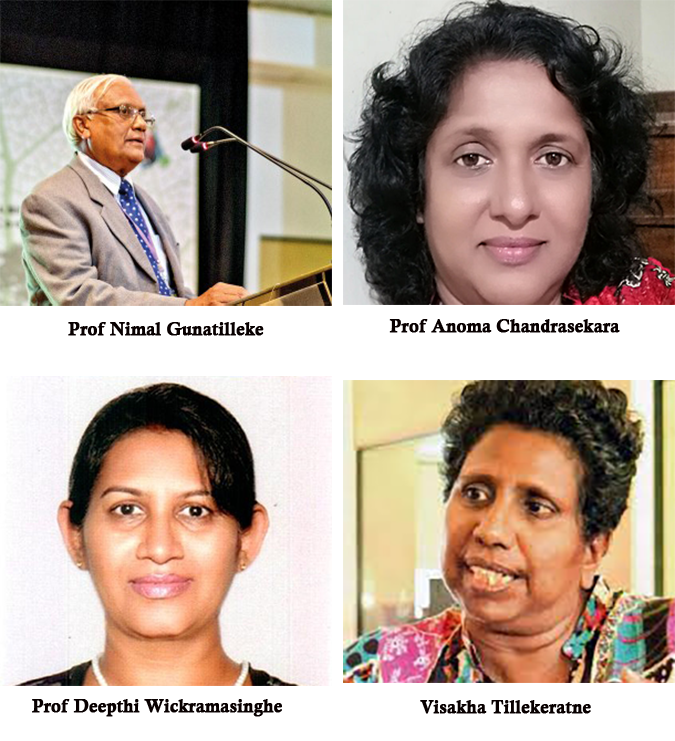
Sri Lanka’s worst post-war economic crisis represents a major blow to the country’s progress towards achieving the United Nations’ Sustainable Development Goals (SDGs), efforts that were already hobbled by the COVID pandemic. However, the situation is also providing impetus to the work of academics that are using their knowledge to tackle the immediate fallout from the crisis, in addition to longer-term sustainability goals, says a report published by the University World News, an online publication that reports on higher education news and developments from a global perspective. It quotes Deepthi Wickramasinghe, conservation biologist and professor at the University of Colombo, having said that university students, from rural areas, studying at the University of Colombo, were cutting down on their food intake to make ends meet.
“In September, Sri Lanka’s cost of living index climbed to a new high over 70%, up from 66.2% in 2020.
“Students from rural areas cannot afford the higher food and living prices in Colombo city.
“With poverty increasing in the country, Sri Lanka will certainly not be able to make progress to achieve its targets by 2030,” she said.
“The [economic] crisis has raised the importance of assessing regional SDG progress, rather than relying on national statistics,” she said.
“Against looming poverty and hunger, the priority in Sri Lanka’s SDG activities should be on support for vulnerable populations – children and the elderly, especially in the low-income sectors,” said Prof Anoma Chandrasekara, at the Department of Applied Nutrition of Faculty of Livestock, Fisheries and Nutrition at the Wayamba University.
Worldwide, SDG progress has been dented as a result of the COVID-19 pandemic. But Wickramasinghe said the toll on Sri Lanka, saddled with a huge debt and political uncertainty, is heavy. Imports are restricted to save foreign exchange, and fuel shortages have created major problems, including pushing up public transportation prices, directly affecting poorer populations.
Human rights violations, especially recent arrests of peaceful protesters, in Colombo, have also caused Sri Lanka to deteriorate in terms of SDG 16, ‘Peace, justice and strong institutions’.
A report from an Amnesty International researcher on economic, social and cultural rights, released this month, entitled We Are Near Total Breakdown, also pointed to life-threatening shortages of medicine, such as antibiotics and insulin, and essential equipment.
“To survive we need to eat, and with increasing prices, growing our own food that can provide the necessary proteins and other nutrients is the way forward,” said Visakha Tillekeratne, a nutrition expert involved in a research project started with Wayamba University, in 2019.
“The aim is to encourage people to cultivate a home garden that will provide a good diet. This is a concept [that has] grown out of the pandemic and economic crisis,” said Tillekeratne, who supports rural communities.Supported by the UN’s Food and Agriculture Organization, Chandrasekara and her team spearheaded a study on guidelines for a new home garden model, based on technical and dietary reviews.
Chandrasekara has researched the bioactivities, such as antioxidant and glucose response actions of phenolic compounds to ascertain the nutritional value of under-utilised tropical foods, including cereals, legumes, roots and tubers, herbs and condiments.
Nimal Gunatilleke, emeritus professor and a forest biologist, conducting conservation research at the University of Peradeniya, is also a promoter of home-grown funding models to support rural livelihoods.
His research backs the promotion of ‘green labelling’ for local, organically grown foods which contribute to sustainability and improvement of rural livelihoods through traditional cottage industries. ‘Green labelling’ helps smallholder farmers to compete against large plantations that also damage local biodiversity.
Based on his research, he is a leading advocate of additional green financing options beyond Sri Lanka’s traditional approach of loans, grants and national spending measures, which, he said, can reduce the day-to-day impact of the debt crisis. He pointed to the need to rely on other sources of income, apart from a bail-out by the International Monetary Fund currently being discussed by the government.
Gunatilleke has played a role in the development of Sri Lanka’s Biodiversity Finance Plan established by the Central Bank of Sri Lanka, in 2018, to promote green financing as a sustainable financing solution for agriculture, land use and conservation. He advocates the design and development of innovative ways of green financing, such as green bonds, sustainable bonds, climate bonds, etc., that can bring direct benefits to smallholders who are the lifeblood of the Sri Lankan economy.
Gunatilleke contends that ecological schemes are an innovative financial solution to the twin crises of climate change and debt distress in Sri Lanka. “It is a means to mobilise a large amount of financial resources and represents a new source of financing,” he told University World News. Sri Lanka has in place most of its key development strategies and plans for the next several years in conformity with the major global conventions on biodiversity, he explained. “The current [economic] adversity is an opportunity to gain the interest of donor agencies in entering green financing partnerships,” he said.
News
Govt. urged to take action against deputy minister

Allegation of doing business with state:
Civil society activist Oshala Herath has said that regardless of the political party one represents, all members of Parliament should abide by the law of the land. Herath said so when The Island sought his response to a report that he was planning to move court against Deputy Minister Eranga Weeraratne, Deputy Minister of Digital Economy, accused of holding the top positions at Omobio (Pvt.) and Eimsky Business Solutions (Pvt.) Ltd., at the time of the nominations, and took oaths as a National List MP of the NPP government.
President Anura Kumara Dissanayake is the Minister of Digital Economy, in addition to being Minister of Defence and Finance.
Herath is the Chairman of Abhinawa Niwahal Peramuna. Herath, whose legal challenge to SJB MP Diana Gamage over her citizenship issue, led to her removal from Parliament by the Supreme Court on 08 May, last year. He said the latest case underscored the responsibility on the part of political parties to ensure transparency in the nomination process as well as in the finalisation of National List.
Herath pointed out that the court rulings on petitions filed by him against two serving MPs were pending. He moved court against Jaffna District Independent MP Ramanathan Archchuna for handing over nominations to contest the 2024 November parliamentary elections without resigning from his post as a government medical officer. He also moved court against Minister of Rural Development, Social Security and Community Empowerment, Dr. Upali Pannilage, alleging that he had been an employee of the University of Ruhuna at the time he was declared an MP and subsequently appointed as a Cabinet Minister.
Our efforts to contact Deputy Minister Weeraratne were in vain. Our calls went unanswered.
Pointing out that there were many attorneys-at-law in the current Parliament, Herath emphasised the responsibility on their part to take up the issue. The Speaker should, on his own, inquire into such allegations in addition to the Parliamentary Privileges Committee stepping in, Herath said. Responding to another query, Herath said that such violations as well as cases of conflict of interests were far more serious than the recent controversy over NPP National List MP Asoka Ranwala’s educational qualifications.
SJB MP Ajith P. Perera told The Island that the Deputy Minister concerned admitted in Parliament that he had held top posts in the companies mentioned at the time he took oaths as an MP. Therefore, there couldn’t be any ambiguity with regard to his fault. Perera said that the conflict of interest issue involving NPPer was far more serious.
Referring to the issue at hand that had been first raised by SJB lawmaker Amila Prasad Siriwardena in Parliament during committee stage of the debate on the 2026 Budget, Attorney-at-Law Perera said that Weeraratne’s companies were engaged in mega business deals with the government. Declaring that they had secured contracts for government projects since 2019, Perera said that one of the companies Weeraratne was involved in had recently won a major contract from the incumbent government regarding the electronic ticketing system.
Kalutara District MP called for a comprehensive inquiry into the issue as the NPP had come to power, accusing all other political parties of waste, corruption, irregularities and mismanagement of state funds. MP Perera queried whether the current dispensation followed proper procedures in selecting Weeraratne’s company for the ticketing project
Both Herath and Perera urged the JVP and NPP to look into what they called the Weeraratne affair.
Over the years, several MPs had been disqualified to hold parliamentary seats. Dr. Rajitha Senaratne is one of them. When the Court of Appeal dismissed Dr. Senaratne from Parliament for being a supplier to the government, Ranil Wickremesinghe brought him back to Parliament, through the National List.
MP Perera said that since the last parliamentary election, the NPP had been embroiled in many controversies, including the release of 323 containers from the Colombo Port, in January this year, followed by signing of seven Memorandums of Understanding (MoUs)/agreements with India in April.
By Shamindra Ferdinando
News
India sends stock of life-saving medicines
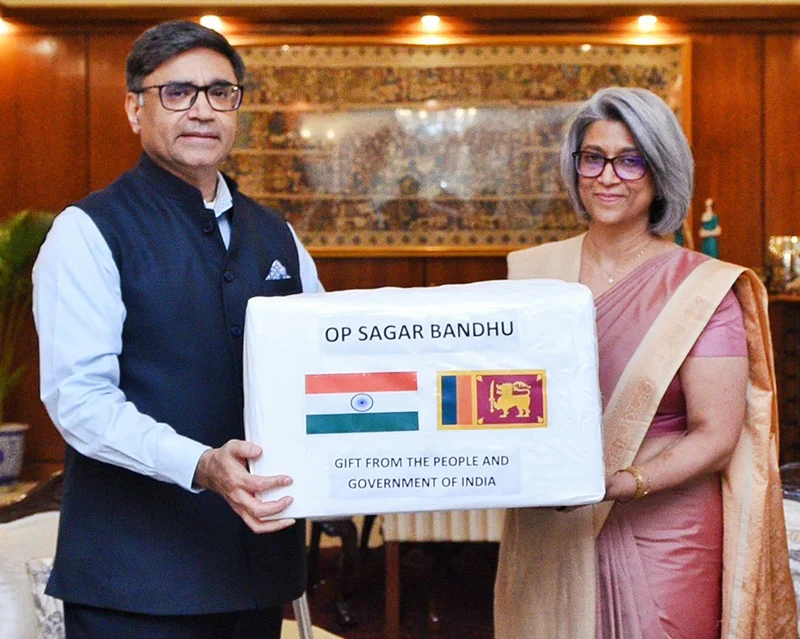
The government has appealed to India for immediate help to overcome the serious shortage of life-saving drugs and injections.
The Sri Lankan High Commission in New Delhi confirmed the appeal made by the government. The following is the text of statement issued by the Sri Lankan mission in New Delhi: “The Foreign Secretary of India, Vikram Misri, over the weekend handed over a consignment of urgently required essential medicines to Sri Lanka’s High Commissioner to India, Mahishini Colonne, in New Delhi. The assistance, extended in response to a request from the Government of Sri Lanka, forms part of Operation Sagar Bandhu, India’s humanitarian mission supporting Sri Lanka’s relief, recovery, and reconstruction efforts following the devastating Cyclone Ditwah.
The consignment consists of over 400 boxes of life-saving medicines and injections, which will be airlifted to Colombo by an Indian Air Force C-17 aircraft, alongside further additional relief assistance from India.
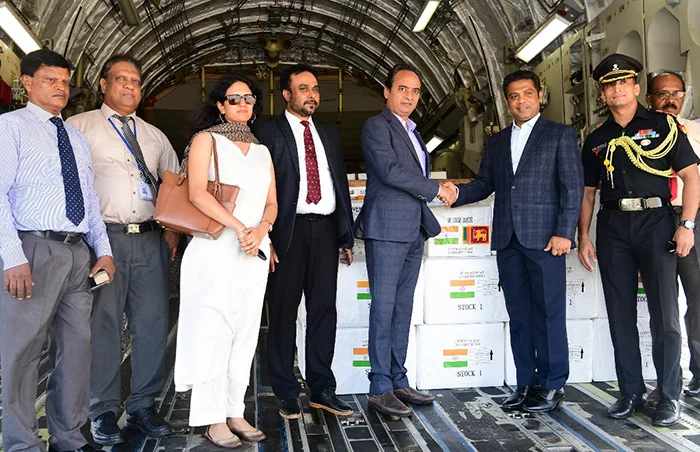
Deputy Indian High Commissioner Pandey shaking hands with Health Minister Dr. Nalinda Jayathissa
Foreign Secretary Misri reiterated the condolences of the Government and people of India for the tragic loss of lives and the extensive damage to infrastructure caused by the Cyclone. He reaffirmed India’s steadfast commitment to supporting Sri Lanka’s immediate humanitarian needs as well as rebuilding and reconstruction efforts. He also highlighted India’s readiness to work with Sri Lanka on a mix of initiatives tailored to the needs of affected communities.
High Commissioner Colonne conveyed the sincere appreciation of the President, Government, and people of Sri Lanka for India’s timely, continuous, and sustained support, and handed over to the Foreign Secretary, a letter of gratitude from the President of Sri Lanka to the Prime Minister of India.
Describing the extensive nature of the damage, the High Commissioner appreciated the ongoing and consistent engagement of the Indian High Commission in Colombo, in collaboration with government officials and local authorities in coordinating relief, rescue, and recovery efforts.
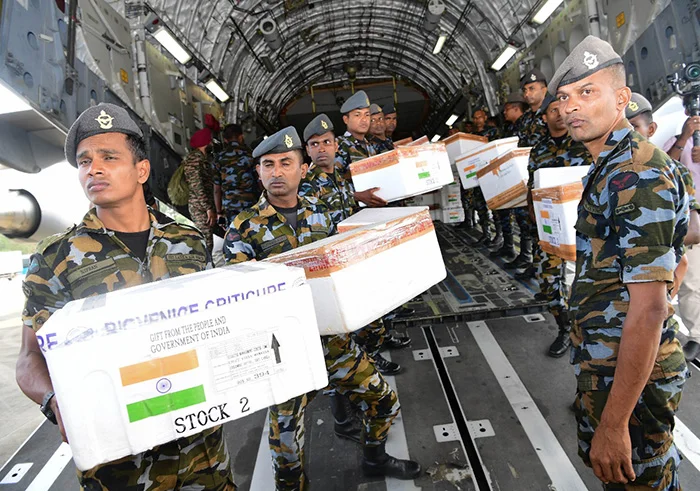
SLAF personnel unloading medicine from IAF transport plane
The High Commissioner also requested India’s support in sharing its expertise and leadership in enhancing disaster-response capabilities and disaster-resilience frameworks, especially lessons from Odisha and Andhra Pradesh, both globally recognized for their advanced disaster resilience frameworks. Apart from this support that is under discussion, the New Delhi-based Coalition for Disaster Resilient Infrastructure (CDRI) has also been requested to undertake a visit to Sri Lanka to explore avenues for strengthening Sri Lanka’s disaster resilient infrastructure capacities. Noting the importance of having an effective and real-time warning system, efforts are being made to deploy a team to explore the establishment of an early warning system that would provide real-time geo-targeted alerts to citizens.
The High Commissioner reiterated Sri Lanka’s gratitude to the Government and people of India for their continued solidarity under Operational Sagar Bandhu, reaffirming the strength of the longstanding partnership between the two nations.”
News
George Keyt Foundation contributes to national disaster relief efforts
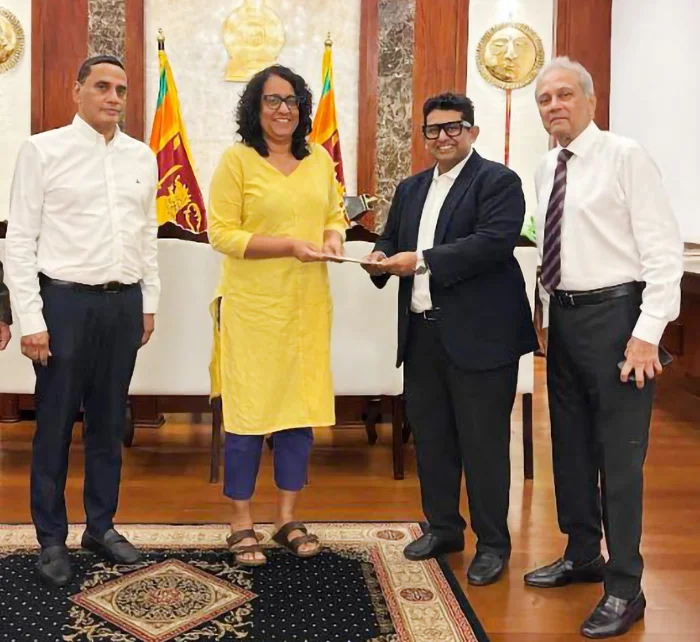
The George Keyt Foundation (GKF) has extended meaningful support to the Government of Sri Lanka’s disaster relief efforts following the severe devastation caused by Cyclone Ditwah.
The text of the press release issued by the GKF: “In 2023, the Foundation undertook its first major fundraiser in recent years by issuing 30 numbered limited edition prints of Kangodi Rangi, a painting by George Keyt entrusted to the Foundation. Twenty-eight prints were acquired by donors to support charitable causes, while another was gifted to the President’s collection. Print Number 1 of 30 was retained to support the Foundation’s long-term priorities.
In light of the unprecedented impact of Cyclone Ditwah and the urgent national need for disaster assistance, the trustees unanimously resolved to seek a donor for Print Number 1 of 30, with clear disclosure that the proceeds would be channeled directly to the Government’s disaster relief programme. This appeal received an immediate response, resulting in a private donation of Rs. 3 million.
The contribution was formally handed over to Prime Minister Harini Amarasuriya for utilisation in the Government’s ongoing relief and recovery efforts.
The George Keyt Foundation is honoured to support the people of Sri Lanka at this critical moment and reaffirms its commitment to serving national needs while preserving and promoting the artistic legacy of George Keyt.
-

 Features6 days ago
Features6 days agoFinally, Mahinda Yapa sets the record straight
-

 News7 days ago
News7 days agoCyclone Ditwah leaves Sri Lanka’s biodiversity in ruins: Top scientist warns of unseen ecological disaster
-

 Features6 days ago
Features6 days agoHandunnetti and Colonial Shackles of English in Sri Lanka
-

 Business4 days ago
Business4 days agoCabinet approves establishment of two 50 MW wind power stations in Mullikulum, Mannar region
-
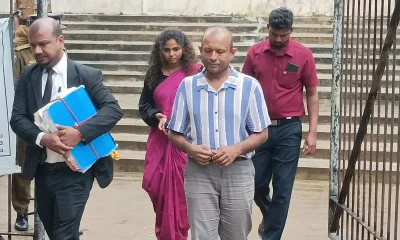
 News5 days ago
News5 days agoGota ordered to give court evidence of life threats
-
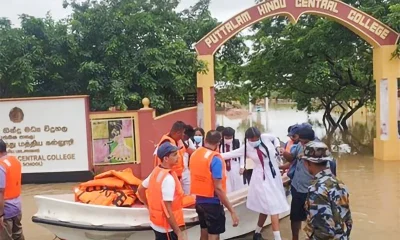
 Features7 days ago
Features7 days agoAn awakening: Revisiting education policy after Cyclone Ditwah
-

 Features5 days ago
Features5 days agoCliff and Hank recreate golden era of ‘The Young Ones’
-
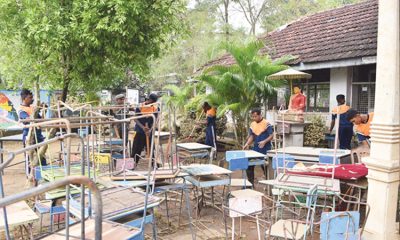
 Opinion6 days ago
Opinion6 days agoA national post-cyclone reflection period?













